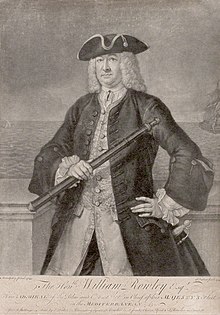William Rowley (Admiral)
Sir William Rowley KB ( 1690 - January 1, 1768 ) was a British admiral.
Life
William Rowley was born around 1690 to William Rowley. Before 1729 he married Arabella Dawson. The marriage resulted in four sons and a daughter, including Clotworthy and Joshua Rowley .
Rowley volunteered in the Royal Navy in 1704 and served under the command of Captain John Norris . 1708 he was promoted to lieutenant. As such, he served on HMS Somerset until May 1713 . In 1716 he was promoted to captain and was given command of HMS Bideford . For the next two years he stayed with the Bideford off Gibraltar and took action against Saléi pirates. In 1719 he moved to HMS Lively , which operated on the coast of Ireland, mainly between Dublin and Carrickfergus . In 1739 he was offered command of the HMS Ripon, but refused because he had legal problems to clarify and wanted to stay on land for the time being. In early 1741 he finally took over the HMS Barfleur , which was part of the English fleet in the Mediterranean under the command of Nicholas Haddock , and later under his successor as commander-in-chief, Thomas Mathews . In 1743 Rowley was appointed Rear Admiral of the White Flag. During the naval battle at Toulon , he commanded the advance guard of the English fleet. Despite the unsatisfactory outcome of the battle for the UK, Rowley's decisions, unlike those of the other commanders, were not called into question. In June 1744 he was promoted to Vice Admiral of the Blue Flag and finally took over command of the English fleet in the Mediterranean as Mathew's successor in August. In July 1745 he was ordered back to England. This was preceded by a court martial against Captain Richard Norris, the son of John Norris, in which Rowley had presided, which was criticized as partisan. On April 30, 1745, the House of Commons passed a resolution in the course of the investigation into the sea battle at Toulon, which described the process as "partial, arbitrary and illegal". The Royal Navy Admiralty also assessed Rowley's role in the proceedings as improper and ordered the said return to England. Rowley never returned to sea after that. Despite this incident, Rowley was promoted to blue flag admiral on July 15, 1747, and finally to white flag admiral on May 12, 1748. In 1749 he was given the title of Rear Admiral of Great Britain .
Rowley was a friend of the politician Charles Wyndham , at whose request he took over his seat in the House of Commons for the constituency of Taunton in 1750. Rowley was a member of the House of Commons until 1761. From 1754, however, for the constituency of Portsmouth.
Wyndham, in turn, made it possible for his friend to sit on the Royal Navy Admiralty. Rowley served from June 1751 to November 1756 as Lord Commissioner of the Admiralty in the same. With the resignation of Thomas Pelham-Holles, 1st Duke of Newcastle-upon-Tyne , Rowley lost this post again. When Holle's successor William Cavendish, 4th Duke of Devonshire , was replaced by Thomas Pelham-Holles in 1757, Rowley was again Lord Commissioner of the Admiralty in the Admiralty of the Royal Navy for a short time from April to July 1757 . In 1762 he was appointed Admiral of the Fleet .
On December 12, 1753 he was accepted as a Knight Companion in the Order of the Bath and thereby raised to the knighthood .
family
William Rowley started his family's maritime tradition. Among other things, his son Joshua Rowley , as well as his grandsons Josias Rowley , Charles Rowley , Samuel Campbell Rowley and George Martin reached high ranks in the Royal Navy.
literature
- Dictionary of National Biography, 1885-1900, Volume 49
- Edward Harding: Naval biography; or, The history and lives of distinguished characters in the british navy , Volume 2 (1805)
Web links
- L. Namier , J. Brooke. [Ed.]: Entry on William Rowley in The History of Parliament: the House of Commons 1754–1790 (1964)
- R. Sedgwick [Ed.]: Entry on William Rowley in The History of Parliament: the House of Commons 1715–1754 (1970)
| personal data | |
|---|---|
| SURNAME | Rowley, William |
| BRIEF DESCRIPTION | British admiral |
| DATE OF BIRTH | around 1690 |
| DATE OF DEATH | January 1, 1768 |
